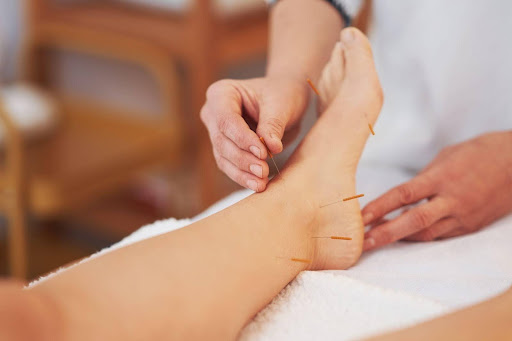
The Science of Acupuncture for Menopause Symptoms: What Research Says
Acupuncture for Menopause: A Comprehensive Overview
Menopause marks a significant transition in a woman’s life, signaling the end of her reproductive years. It’s a phase that brings a range of physical, emotional, and psychological changes. For some, these changes are mild and manageable, but for others, menopause can be a challenging time, filled with uncomfortable symptoms like hot flashes, night sweats, mood swings, and sleep disturbances. As more women seek natural remedies to manage these symptoms, acupuncture for menopause symptoms has emerged as a popular alternative to conventional hormone replacement therapy (HRT).
In this blog, we’ll delve into how acupuncture for menopause can offer relief during this transitional phase and why it’s gaining traction as a holistic approach to managing menopausal symptoms.
Understanding Menopause and Its Symptoms
Menopause typically occurs in women between the ages of 45 and 55, though it can happen earlier or later. The transition to menopause, known as perimenopause, can last several years. During this time, the body’s production of hormones like estrogen and progesterone fluctuates, leading to a variety of symptoms that can impact daily life.
Some of the most common symptoms of menopause include:
- Hot Flashes: Sudden feelings of warmth, often accompanied by sweating and a flushed appearance.
- Night Sweats: Excessive sweating during sleep, often leading to disrupted sleep patterns.
- Mood Swings: Emotional fluctuations that can range from irritability to depression.
- Sleep Disturbances: Difficulty falling or staying asleep, often due to night sweats or anxiety.
- Vaginal Dryness: Decreased estrogen levels can lead to dryness and discomfort in the vaginal area.
- Decreased Libido: Hormonal changes can reduce sexual desire.
- Weight Gain: Hormonal shifts can contribute to changes in metabolism and body weight.
These symptoms vary in intensity from woman to woman. For some, they are merely a nuisance, while for others, they can significantly impact the quality of life.
Traditionally, HRT has been prescribed to alleviate these symptoms, but concerns about the risks associated with long-term hormone use have led many women to explore alternative treatments, including menopause acupuncture treatment.
What is Acupuncture?
Acupuncture and menopause relief have been intertwined since ancient times. Acupuncture is an ancient healing practice that originated in China over 2,500 years ago. It involves the insertion of thin needles into specific points on the body, known as acupuncture points or acupoints.
These points are believed to be connected by pathways called meridians, through which life energy, or “Qi” (pronounced “chee”), flows. According to traditional Chinese medicine (TCM), illness and discomfort occur when the flow of Qi is disrupted or imbalanced. Acupuncture is said to restore the proper flow of Qi, promoting healing and balance within the body.
In the context of modern medicine, acupuncture for menopause is often viewed as a complementary therapy that can help stimulate the body’s natural healing processes. The insertion of needles is thought to trigger the release of endorphins (natural painkillers) and other neurochemicals, reduce inflammation, and improve blood circulation.
How Acupuncture Can Help with Menopause
Acupuncture for menopause symptoms offers a holistic approach to managing them by addressing the underlying imbalances in the body rather than just treating individual symptoms. Here’s how menopause acupuncture treatment can help with some of the most common menopausal complaints:

Hot Flashes and Night Sweats
Acupuncture for menopause has been shown to regulate the body’s temperature control mechanisms, reducing the frequency and intensity of hot flashes and night sweats. This is thought to be achieved by balancing the hypothalamus-pituitary-ovarian axis, which plays a key role in hormone regulation.
Mood Swings and Emotional Well-being
Menopause can be a time of emotional upheaval, with mood swings, anxiety, and depression being common. Acupuncture and menopause have a connection in this regard, as acupuncture is believed to promote the release of serotonin and endorphins, neurotransmitters that improve mood and reduce stress. Regular acupuncture sessions can help stabilize emotions and promote a sense of well-being.
Sleep Disturbances
Insomnia and poor sleep quality are often linked to menopause. Acupuncture for menopause symptoms can help improve sleep by regulating the nervous system, reducing anxiety, and addressing the root causes of sleep disturbances, such as night sweats or hormonal imbalances.
Vaginal Dryness and Discomfort
While acupuncture for menopause cannot directly increase estrogen levels, it can improve blood flow to the pelvic region, which may help alleviate symptoms like vaginal dryness. Additionally, acupuncture can support overall hormone balance, which may indirectly benefit vaginal health.
Fatigue and Low Energy
Many women experience fatigue and low energy during menopause. Menopause acupuncture treatment can boost energy levels by improving the flow of Qi and blood throughout the body. It also supports adrenal function, which can be particularly beneficial for women experiencing fatigue due to stress and hormonal changes.
Weight Management
Hormonal fluctuations during menopause can lead to weight gain, particularly around the abdomen. Acupuncture for menopause symptoms can support weight management by regulating appetite, improving digestion, and addressing stress-related eating patterns. It can also help balance insulin and cortisol levels, which play a role in metabolism and fat storage.
The Science Behind Acupuncture and Menopause
While acupuncture has been practiced for millennia, scientific research into its effects is still evolving. However, several studies have shown promising results in using acupuncture for menopause symptoms.

- Hot Flashes: A 2016 study published in the journal Menopause found that acupuncture for menopause significantly reduced the frequency and severity of hot flashes in menopausal women. The effects were sustained for up to six months after treatment.
- Mood and Sleep: A 2018 study in the journal BMJ Open reported that acupuncture for menopause symptoms was associated with improvements in sleep quality and emotional well-being in perimenopausal and postmenopausal women. Participants reported reduced anxiety and depression symptoms, as well as better overall sleep.
- Vaginal Dryness: Research published in the journal Acupuncture in Medicine in 2017 found that acupuncture for menopause symptoms improved blood flow to the pelvic area and reduced symptoms of vaginal dryness in menopausal women. While the study was small, it highlighted the potential of menopause acupuncture treatment as a complementary therapy for menopausal discomfort.
These studies suggest that acupuncture for menopausal symptoms may be a viable option for women seeking natural relief from menopausal symptoms. However, it’s important to note that acupuncture’s effectiveness can vary depending on the practitioner’s skill, the frequency of treatments, and individual patient factors.
What to Expect During an Acupuncture Session
If you’re considering acupuncture for menopause symptoms, it’s important to know what to expect during a session.
Here’s a general overview:
- Initial Consultation: Your first visit will likely involve a detailed consultation where the acupuncturist will ask about your medical history, symptoms, and lifestyle. This helps the practitioner understand your overall health and determine the best treatment approach.
- Needle Insertion: During the session, the acupuncturist will insert thin, sterile needles into specific points on your body. The insertion is usually painless, though you may feel a slight tingling or warmth. The needles are typically left in place for 20 to 30 minutes.
- Relaxation: Many people find acupuncture sessions to be deeply relaxing. The treatment room is often quiet, with soft lighting and soothing music. Some people even fall asleep during the session.
- Follow-Up Sessions: Acupuncture for menopause is most effective when done regularly. Your practitioner will recommend a treatment plan based on your symptoms and goals. This may involve weekly sessions initially, followed by maintenance sessions as needed.
Integrating Acupuncture with Other Therapies
Acupuncture for menopause symptoms can be used alongside other therapies to enhance overall well-being during menopause. For example:
- Herbal Medicine: In traditional Chinese medicine, acupuncture for menopause is often combined with herbal remedies that support hormone balance and alleviate symptoms. An experienced practitioner can recommend specific herbs that complement your acupuncture treatment.
- Diet and Lifestyle: Acupuncture for menopause symptoms is most effective when combined with a healthy diet and lifestyle. Eating a balanced diet, exercising regularly, and managing stress can all contribute to better menopause management.
- Mind-Body Practices: Techniques like meditation, yoga, and tai chi can enhance the benefits of menopause acupuncture treatment by promoting relaxation and emotional balance.

Is Acupuncture Right for You?
Acupuncture for menopause symptoms is generally considered safe when performed by a licensed and trained practitioner. However, it’s not suitable for everyone. If you have a bleeding disorder, are taking blood thinners, or are pregnant, you should consult with your healthcare provider before starting acupuncture.
It’s also important to have realistic expectations. While many women find relief from menopausal symptoms with acupuncture for menopause, it’s not a quick fix. The effects may take several sessions to become noticeable, and not all symptoms may respond equally to treatment.
Key Takeaway
The growing body of evidence suggests that acupuncture for menopausal symptoms is not only effective in reducing a variety of menopausal symptoms but also offers a safer alternative to hormone replacement therapy, which has been associated with certain risks. Acupuncture for menopause provides relief from hot flashes, mood disturbances, sleep issues, and overall menopausal symptoms, making it an attractive option for women seeking a natural, non-invasive approach to managing this life transition.
By incorporating menopause acupuncture treatment into a broader wellness plan, including diet, exercise, and stress management, women can navigate menopause with greater ease and confidence, embracing this natural phase of life with a renewed sense of balance and well-being.
Citations

Sruthakeerthi Shenoy





